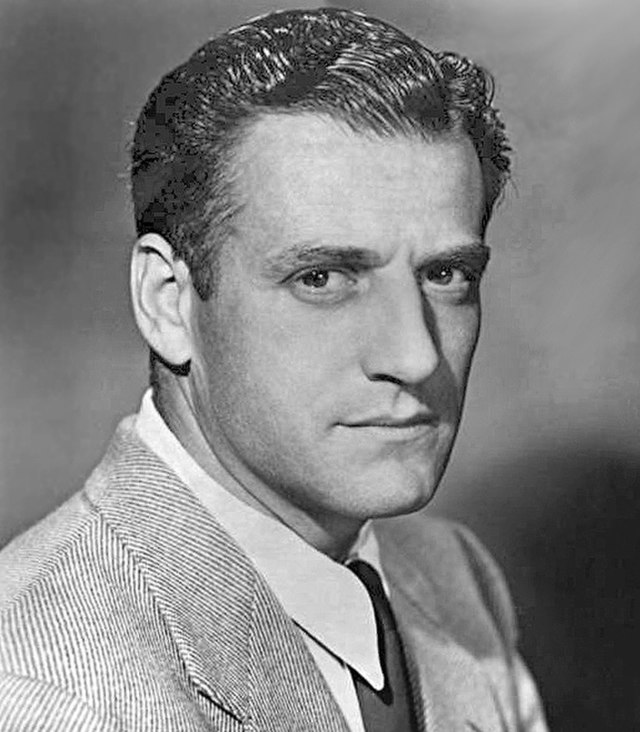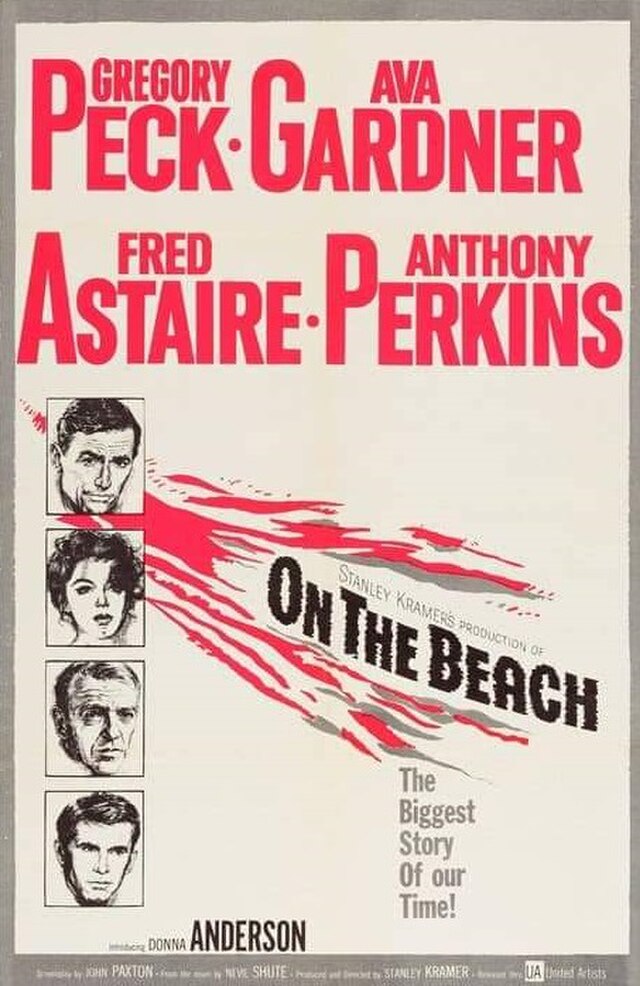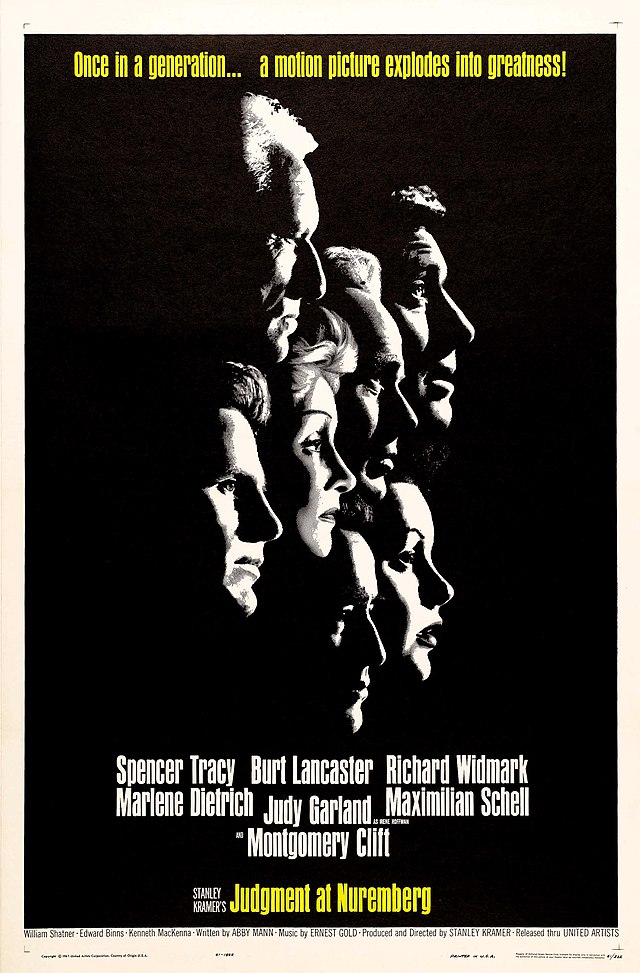Stanley Kramer
back| Full Name | Stanley Earl Kramer |
| Born | September 29, 1913 |
| Birthplace | Manhattan, New York City, New York, USA |
| Died | February 19, 2001 |
| Buried | Pierce Brothers Westwood Village Memorial Park, Los Angeles, California, USA |
| Married to | Marilyn Erskine (divorced), Anne Pearce (divorced), Karen Sharpe (m. 1966 until his death in 2001) |
| Children | 4 (two daughters with Karen Sharpe, one daughter and one son from previous marriages) |
| Notable films | The Caine Mutiny (1954) - On the Beach (1959) - Judgment at Nuremberg (1961) - Ship of Fools (1965) |
Stanley Kramer
Hollywood's Conscience
Stanley Kramer was known for his socially conscious films tackling issues like racism, nuclear threats, and social justice. He began his career in the 1940s and quickly earned a reputation as a producer and director unafraid of controversial topics.
Kramer's influential works left a lasting impact on Hollywood, establishing him as a director who used film as a medium for social commentary. His dedication to exploring pressing societal themes has made him a celebrated figure in American cinema history.
Related
Stanley Kramer (1913 – 2001)
Biography and Movie Career
Stanley Earl Kramer was born on September 29, 1913, in New York City, into a family deeply tied to the film industry. His mother worked as a secretary at Paramount Pictures, and his uncle was a film editor. These early connections introduced Kramer to the world of film and set the stage for his remarkable career. Though his family life was complicated by his parents' separation, Kramer persevered, moving to Los Angeles, where he attended high school and later studied at New York University. After graduating in 1933, Kramer returned to Los Angeles, determined to pursue a career in Hollywood.
Kramer began working at various studio jobs, eventually landing at Columbia Pictures, where he honed his skills and built connections. By the late 1940s, he had started his own independent production company, a rarity in a Hollywood dominated by major studios. This independence allowed Kramer to explore controversial and socially conscious themes that would later become his hallmark.
His breakthrough as a producer came with Champion (1949), a boxing drama that earned six Academy Award nominations, establishing Kramer as a serious figure in Hollywood. However, it was as a director that Kramer truly made his mark. Known for tackling heavy topics, he earned a reputation as a filmmaker willing to challenge social and political issues head-on. His 1952 classic High Noon brought themes of courage and morality to the forefront and became an allegory for McCarthyism and the Hollywood blacklist, further cementing his reputation as a socially conscious director.
Throughout the 1950s and 1960s, Kramer directed a series of influential films, each dealing with a unique social or political issue. The Caine Mutiny (1954), adapted from Herman Wouk’s novel, addressed authority and mental illness in the military. On the Beach (1959) explored the threat of nuclear war and the human cost of atomic power. In Inherit the Wind (1960), Kramer used the Scopes "Monkey" Trial to reflect the ongoing debate over science, religion, and education.
One of his most powerful films, Judgment at Nuremberg (1961), tackled the Nuremberg Trials and examined the horrors of Nazi war crimes, asking audiences to grapple with themes of justice, guilt, and complicity. These films, which featured some of Hollywood’s finest actors—Spencer Tracy, Burt Lancaster, and Katharine Hepburn, among others—brought Kramer multiple Academy Award nominations and cemented his legacy as a socially conscious filmmaker.
Kramer’s 1963 comedy It's a Mad, Mad, Mad, Mad World showcased a different side of his creativity. Although known for his serious dramas, this star-studded, high-energy comedy became a box-office success and demonstrated Kramer’s versatility.
Kramer’s 1967 film Guess Who's Coming to Dinner, one of his most celebrated works, directly addressed interracial marriage, a hotly debated issue in the United States at the time. The film starred Spencer Tracy and Katharine Hepburn as parents grappling with their daughter's relationship with a Black man, played by Sidney Poitier. Released during the civil rights era, the film became a landmark cultural statement on tolerance and acceptance.
In his personal life, Kramer experienced multiple marriages. He married his final wife, actress Karen Sharpe, in 1966, and the two remained together until his death. Kramer had four children across his marriages, and his family life was often intertwined with his work; his wife Karen even became involved in some of his later projects. Despite the challenges of the industry, Kramer remained steadfast in his vision, often shouldering the burden of financing and producing films that others deemed too risky.
Kramer continued directing and producing films into the 1970s, though his later work did not receive the critical acclaim of his earlier productions. Nevertheless, his commitment to social issues and his willingness to challenge convention left an indelible mark on American cinema. In recognition of his contributions, Kramer received the Irving G. Thalberg Memorial Award from the Academy of Motion Picture Arts and Sciences in 1961, a prestigious honor awarded to producers whose body of work reflects high quality and influence.
Stanley Kramer passed away on February 19, 2001, in Los Angeles, California. He was laid to rest at Pierce Brothers Westwood Village Memorial Park. Remembered as a pioneering filmmaker who blended entertainment with ethical inquiry, Kramer remains one of Hollywood’s most important directors. His films, now classic staples, continue to inspire discussions about justice, tolerance, and the power of film as a force for social change.
Stanley Kramer Films
Analysis of Stanley Kramer’s Directing Style
Stanley Kramer’s directing style is characterized by his commitment to social realism, strong moral themes, and a blend of drama and intellectual inquiry. He became one of the most prominent voices in Hollywood who used film as a vehicle for social change, often challenging audiences to confront uncomfortable truths about society, justice, and human nature. Here are some defining features of his directing style:
Socially Conscious Storytelling
• Kramer is widely regarded as a pioneer of message-driven films, often taking on controversial and polarizing topics, such as racism (The Defiant Ones), nuclear annihilation (On the Beach), religious and scientific conflict (Inherit the Wind), and the consequences of fascism (Judgment at Nuremberg).
• His films often confront issues head-on, emphasizing the moral weight of each story. He aimed to provoke discussion and reflection, sometimes at the cost of box-office appeal but often winning critical acclaim for his courage and dedication to social issues.
Humanist Approach to Characters
• Kramer’s characters are often portrayed with depth and complexity, regardless of whether they are protagonists or antagonists. Rather than reducing them to stereotypes, he explores the nuances of their motivations and prejudices.
• In films like Guess Who’s Coming to Dinner, he presents characters with conflicting emotions and biases, allowing them to grow and confront their own beliefs. His focus on empathy and character-driven storytelling allowed audiences to see themselves in his characters and recognize their own internal conflicts.
Bold Cinematic Style and Symbolism
• While his films are often noted for their heavy dialogue and intellectual themes, Kramer used strong visual symbols to reinforce his points. For instance, in On the Beach, the desolate landscapes of Australia visually capture the eerie calm before the apocalypse.
• He avoided flashy cinematography, opting instead for a straightforward style that kept the focus on the story and themes rather than on technical showmanship. His subtle, carefully composed shots often served to heighten the intensity of the narrative.
Ethical and Moral Dilemmas
• Kramer’s films frequently present his characters with ethical crossroads that force them to confront moral and social issues. In Judgment at Nuremberg, for example, characters grapple with the difficult questions of guilt, responsibility, and justice.
• This aspect of his style resonates in nearly all of his films, as Kramer invites viewers to examine their own beliefs and to question what they would do in similar situations. His commitment to portraying the complexity of human morality distinguishes his work from more conventional Hollywood narratives.
Emphasis on Realism and Verisimilitude
• Kramer’s films often had a documentary-like quality, grounded in realism and attention to detail. He meticulously researched the topics of his films, especially those dealing with historical events like the Scopes Trial in Inherit the Wind or the Nuremberg Trials in Judgment at Nuremberg.
• This commitment to accuracy lent an authenticity to his films that added weight to their social messages, enhancing their educational impact.
Collaborations with Actors and Ensemble Casts
• Kramer was known for bringing together stellar casts, particularly actors who were known for their gravitas and ability to handle complex material. He collaborated frequently with actors like Spencer Tracy, Sidney Poitier, and Katharine Hepburn, ensuring that his socially charged scripts were in capable hands.
• His use of ensemble casts in films like It’s a Mad, Mad, Mad, Mad World showed his ability to manage multiple big personalities on screen, weaving together various storylines in a coherent and impactful way.
Blending Drama with Moments of Humor
• While most of his films are serious in tone, Kramer used humor as a tool to make his messages more accessible. For instance, It’s a Mad, Mad, Mad, Mad World is a broad comedy with slapstick elements, but it also touches on human greed and desperation. Similarly, in The Secret of Santa Vittoria, humor is used to highlight the resilience of villagers under Nazi occupation.
• This combination of humor and drama allowed Kramer to approach heavy topics in ways that were relatable, showing that even the most serious issues can have moments of lightness and absurdity.
Didactic Style and Directness
• Critics sometimes pointed out that Kramer’s films had a didactic tone, as he often dealt with his themes in a straightforward and earnest way. This approach made his films powerful and direct, though some felt it led to a lack of subtlety.
• Nonetheless, Kramer’s clear, forceful style gave his work a distinctive voice in Hollywood, unafraid to engage with topics others might avoid. His focus on moral clarity and social responsibility made his films accessible and left a strong impression on his audiences.
Moral Courage in Storytelling Choices
• Kramer’s willingness to take on stories that highlighted social injustices and push the boundaries of acceptable topics in Hollywood speaks to his personal integrity and desire to influence society positively. He was one of the first filmmakers to use cinema as a form of advocacy, addressing issues like civil rights, anti-Semitism, and the existential threats posed by nuclear weapons.
• This moral courage has made his films enduring, as many of the issues he addressed are still relevant today, reinforcing his legacy as a socially conscious filmmaker.
Personal Quotes
Stanley Kramer was known not only for his impactful films but also for his thought-provoking and often candid reflections on filmmaking, social justice, and human values. Here are some memorable quotes from him:
On his approach to filmmaking and tackling social issues:
• "I tried to make movies that reached people in their hearts and, yes, I did want to make them think, too."
• "The most important thing in making films is to remember that you're communicating with people, and you should try to tell them something that matters."
On why he tackled controversial themes:
• "I have always felt that if you’re going to tackle a social problem in a movie, you should present the problem honestly."
• "I think you must not only entertain the audience, you must involve them. They should be aware of their own world and of other people’s problems."
On the importance of moral and ethical storytelling:
• "To me, faith is a means of inspiration, not a substitute for reason. I want people to ask questions, not find pat answers."
• "I want the audience to look at the world in a different way when they leave the theater."
Reflecting on the legacy of his films:
• "If a picture is really good, the people who see it won’t forget it. I want my films to stay with people, to mean something to them."
• "I’ve never cared about making money. I care about making films that say something and make people think."
On the courage to make "message films":
• "You have to be willing to take the risks to make the kind of films that have something to say, or you’re just wasting film."
• "It’s easy to make an entertaining movie. It’s much harder to make a movie that matters."
On the role of cinema in shaping society:
• "Film has the power to change the world by changing the way people see it."
• "Movies can do more than just entertain. They can engage, they can educate, they can make us see things differently. That’s why I became a director."
What Others said about Stanley Kramer
Katharine Hepburn (Actress, Guess Who’s Coming to Dinner):
"Stanley Kramer, as a producer and director, makes films that matter. He’s not afraid of telling people they have to be better than they are, that they have to care."
Spencer Tracy (Actor, Inherit the Wind, Judgment at Nuremberg, Guess Who’s Coming to Dinner):
"Working with Stanley meant working for something that went beyond the movies. He wanted his films to change the world, and you felt that every day on set."
Sidney Poitier (Actor, The Defiant Ones, Guess Who’s Coming to Dinner):
"Stanley Kramer gave me the opportunities that few others in Hollywood were willing to give. He understood that cinema could open doors, and he wasn’t afraid to make bold statements about race and humanity."
Pauline Kael (Film Critic):
"Stanley Kramer’s films are seldom subtle, but they are passionate. He’s the kind of filmmaker who has a point of view, and he’s not shy about letting you know it. That is rare in Hollywood."
Frank Capra (Director):
"Kramer’s films are an example of cinema as conscience. He was one of the few who dared to make films that asked questions most would rather ignore."
Gene Siskel (Film :Critic)
"Stanley Kramer believed in the power of movies to make a difference. His films challenged audiences, and he never underestimated their intelligence or empathy."
Jack Lemmon (Actor, It’s a Mad, Mad, Mad, Mad World):
"Stanley was a great storyteller, but he was also a crusader. When you worked with him, you knew you were part of something bigger than just a movie."
Charlton Heston (Actor, The Greatest Story Ever Told):
"Kramer’s films weren’t just entertainment; they were arguments. He didn’t care if he stepped on toes. If he believed in something, he put it on screen."
Steven Spielberg (Director):
"Stanley Kramer was a pioneer in message filmmaking. He taught Hollywood that movies could take on big issues, that movies could matter."
Ava DuVernay (Director):
"Stanley Kramer used his voice and platform to highlight issues that were essential. He was a trailblazer in making socially conscious films when few others had the courage."
Gregory Peck (Actor):
"Stanley saw film as a way to speak truth to power. He showed us that film could challenge the status quo and make us better as a society."
Martin Scorsese (Director):
"Kramer made films that were passionate, confrontational, and deeply moral. He believed in cinema as a force for social change, and he never compromised on that vision."
Academy of Motion Picture Arts and Sciences (on presenting him the Thalberg Award):
"Stanley Kramer’s career is a testament to the power of film as a means of confronting social issues. His films challenge us, provoke us, and inspire us to see the world with a more open mind."
Awards and Recognition
Academy Awards (Oscars)
Although Kramer himself never won a competitive Oscar as a director or producer, he received multiple nominations and was awarded an honorary Oscar.
• Nominations:
Best Director:
The Defiant Ones (1958)
Judgment at Nuremberg (1961)
Guess Who’s Coming to Dinner (1967)
Best Picture:
High Noon (1952) - as producer
The Caine Mutiny (1954) - as producer
The Defiant Ones (1958) - as producer
Judgment at Nuremberg (1961) - as producer
Guess Who’s Coming to Dinner (1967) - as producer
• Awards:
Irving G. Thalberg Memorial Award (1961): This honorary award is given to producers whose body of work reflects a consistently high quality of motion picture production.
________________________________________
Golden Globe Awards
Kramer received several nominations and a few wins at the Golden Globes, particularly for films that dealt with social and ethical issues.
• Wins:
Best Director – Motion Picture:
The Defiant Ones (1958)
Best Motion Picture – Drama:
The Defiant Ones (1958)
Best Motion Picture – Musical or Comedy:
It's a Mad, Mad, Mad, Mad World (1963)
• Nominations:
Best Director – Motion Picture:
On the Beach (1959)
Judgment at Nuremberg (1961)
Guess Who’s Coming to Dinner (1967)
________________________________________
British Academy of Film and Television Arts (BAFTA)
Kramer’s socially reflective films earned him multiple BAFTA nominations.
• Nominations:
Best Film:
On the Beach (1959)
Judgment at Nuremberg (1961)
Guess Who’s Coming to Dinner (1967)
Best Foreign Actor:
Judgment at Nuremberg (1961) – Spencer Tracy (as the lead actor in Kramer’s production)
________________________________________
Directors Guild of America (DGA) Awards
Kramer was recognized multiple times by the Directors Guild of America for his outstanding directorial achievements.
• Nominations:
Outstanding Directorial Achievement in Motion Pictures:
The Defiant Ones (1958)
On the Beach (1959)
Judgment at Nuremberg (1961)
Guess Who’s Coming to Dinner (1967)
DGA Special Award:
Honored by the Directors Guild for his overall contributions to the industry and commitment to social issues in film.
________________________________________
Cannes Film Festival
Kramer’s films also received recognition at international festivals like Cannes, where his work was often praised for its bold themes.
• Nominations:
Palme d’Or:
The Pride and the Passion (1957)
The Defiant Ones (1958)
Judgment at Nuremberg (1961)
• Awards:
Gary Cooper Award: (1977) A special award presented to Kramer in recognition of his contribution to cinema and his socially conscious storytelling.
________________________________________
Berlin International Film Festival
Kramer was celebrated at the Berlin Film Festival, where his films were shown as part of the festival's main competition.
• Awards:
Silver Bear for Best Director:
Judgment at Nuremberg (1961)
________________________________________
Venice Film Festival
Kramer was also recognized at the Venice Film Festival for his commitment to themes of social justice and human rights.
• Awards:
UNICEF Award:
On the Beach (1959), recognized for its message on the perils of nuclear war.
Pasinetti Award:
On the Beach (1959), for Best Film by Italian film journalists at Venice.
________________________________________
National Board of Review (NBR)
The National Board of Review honored Kramer for his outstanding contributions to socially conscious filmmaking.
• Awards:
o Best Director: The Defiant Ones (1958)
o Best Film: The Defiant Ones (1958)
o Special Citation: Recognized for his socially relevant films over multiple years.
________________________________________
Honorary Awards and Lifetime Achievement Recognitions
In addition to awards for specific films, Kramer received various honors celebrating his career and influence.
• NAACP Vanguard Award: For promoting social justice through cinema.
• Producers Guild of America: Lifetime Achievement Award in Motion Pictures, celebrating his contributions to the industry as both a producer and a director.
• American Film Institute (AFI): Honored with a special tribute for his career achievements and his influence on socially conscious filmmaking.
Movies Directed by Stanley Kramer
1955 - Not as a Stranger
Synopsis: A medical drama about a young doctor driven by ambition. He marries a nurse for financial stability rather than love, only to face moral and personal conflicts. The film explores themes of ethics, relationships, and the sacrifices made in the pursuit of a career.
1957 - The Pride and the Passion
Synopsis: Set during the Napoleonic Wars, this epic war film follows a British naval officer and a Spanish guerrilla fighter as they attempt to transport a massive cannon across Spain to use against the French. The film is a mix of romance and adventure against the backdrop of war.
1958 - The Defiant Ones
Synopsis: A groundbreaking drama about two escaped prisoners—one Black and one white—who are chained together and must overcome their mutual prejudice to survive. The film addresses racial tensions and human solidarity, earning critical acclaim for its social message.
1959 - On the Beach
Synopsis: Set in a post-apocalyptic world following a nuclear war, the film follows the crew of an American submarine and Australian civilians as they await the inevitable spread of radiation. A somber meditation on the consequences of nuclear conflict, it warns of humanity’s self-destructive potential.
1960 - Inherit the Wind
Synopsis: A courtroom drama based on the famous Scopes "Monkey" Trial, where a teacher is prosecuted for teaching evolution. Through intense legal debates, the film critiques religious fundamentalism and defends intellectual freedom, mirroring real-world debates over science and religion.
1961 - Judgment at Nuremberg
Synopsis: This powerful drama examines the post-WWII Nuremberg Trials, focusing on the prosecution of Nazi judges who enabled atrocities. Through its characters, the film explores themes of justice, accountability, and morality, making audiences confront the horrors of complicity in evil.
1963 - It's a Mad, Mad, Mad, Mad World
Synopsis: A star-studded comedy about a group of strangers who set out on a chaotic race to find a buried treasure. Known for its slapstick humor and ensemble cast, this film is a departure from Kramer's usual serious themes and is one of Hollywood’s classic comedies.
1965 - Ship of Fools
Synopsis: Set on an ocean liner bound for Germany on the eve of WWII, this drama explores the lives and prejudices of passengers from various backgrounds. The film serves as a microcosm of society, examining class, discrimination, and the looming threat of fascism.
1967 - Guess Who’s Coming to Dinner
Synopsis: A timely social drama about an interracial couple who bring the woman’s liberal parents face-to-face with their own prejudices. The film was lauded for its exploration of race relations in America and has remained a cultural touchstone on the topic of tolerance.
1969 - The Secret of Santa Vittoria
Synopsis: Set in a small Italian village during WWII, the film follows townsfolk who attempt to hide a million bottles of wine from the Nazis. Mixing humor with drama, it explores themes of resistance and unity in the face of occupation.
1970 - R.P.M.
Synopsis: A college professor becomes an interim president at a university facing student unrest. The film reflects the social upheavals of the 1960s, tackling issues like activism, generational conflict, and social change, although it received mixed reviews at the time.
1971 - Bless the Beasts and Children
Synopsis: This drama follows a group of misfit boys from a summer camp who set out on a mission to rescue a herd of bison from a slaughter. The film examines themes of bullying, courage, and the innocence of youth, ultimately delivering a message about compassion and empathy.
1973 - Oklahoma Crude
Synopsis: A Depression-era story about a strong-willed woman and her father who attempt to strike oil on their land despite opposition from a powerful oil company. The film is both a comedy and a drama, touching on independence, family bonds, and resilience.
1977 - The Domino Principle
Synopsis: This thriller follows a convicted murderer released from prison by a secret organization in exchange for carrying out an assassination. The film explores themes of control, manipulation, and the loss of individual freedom within corrupt systems.
1979 - The Runner Stumbles
Synopsis: In this courtroom drama, a priest is tried for the murder of a nun he was romantically involved with. Set in a rural Michigan community, the film delves into themes of faith, repression, and the consequences of forbidden love.




